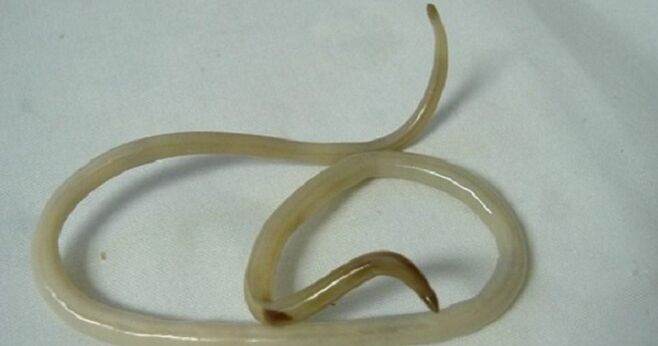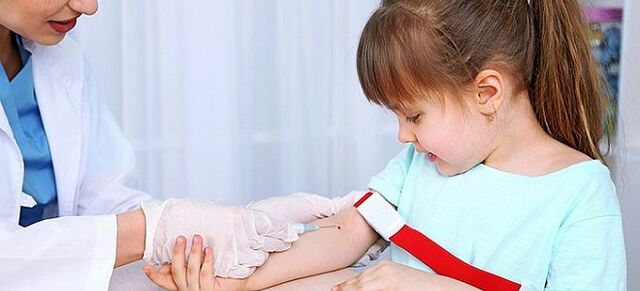
Everyone can get parasites, but babies are especially susceptible, and the risk is especially high in summer. There are different types of worms, but they all have negative health effects. Parents should know what worms are in their children - we'll consider symptoms and treatments for diseases like worm disease below.
Types of Human Worms
There are 12, 000 worms (also called worms) on our planet. They live in soil, food, and animals, while about 200 species can live in humans. Parasites must always have a host and often choose babies as their habitat. When a child learns about the world, he tastes everything at hand, so he is always in danger.
The most common types of worms in children are nematodes or roundworms. These include:
- roundwormscause ascariasis. The worms are large, up to 40 cm in length, and live in the gastrointestinal tract and small intestine.
- pinwormCause enterobiasis. The worms are small (less than 1 cm long) and yellow-white in color. This worm lives in children in the cecum or small intestine. Their life cycle is up to 4 weeks.
- tapeworm- These are flatworms that live in the gut and various organs. Worms can cause diseases such as ganglion cysts, echinococcosis, hymenaria, teniarinhoz and diphyllobothriasis.
- fluke diseaseAre flatworms or flukes. These include cat flukes, abnormal white blood cells, and schistosomiasis. Parasites cause diseases such as fascioliasis and hornworm.
worm infection route
According to official medical statistics, 80% of cases occur in children under the age of 2 and preschool children attending educational institutions. These official figures were recorded on those babies who underwent laboratory tests. Worms use various means to enter the human body. The most common routes of infection are:
- dirty hands or touching infected animals;
- poorly washed fruits or vegetables;
- unboiled water;
- Poorly processed fish or meat.
How do you know your child has worms?
To answer the question of what worms are in a child's body (symptoms and treatment depend on the type of worm), you need to know how the infection occurred and which internal organ the parasite entered. Many times, they do not manifest in any way, and the disease develops in a latent form, so doctors cannot always be sure of their presence. Worms live in the human body for years or even decades, adapting to the harshest conditions.
Common symptoms of worms in children are as follows:
- nausea in the morning;
- anal itching;
- Headache;
- Bruxism - is grinding your teeth in a dream;
- Profuse drooling at night;
- Dizziness;
- nasal polyps;
- Inflammation of the reproductive organs;
- periodic pain around the navel;
- sheep stool, diarrhea or constipation;
- loss of appetite;
- Pale skin.
If you notice more than five of the listed symptoms in your child, it's worth suggesting a worm infestation. Everyone can be a carrier of various parasites that live in the body and cause poisoning and serious illness. Signs may change as the parasite activates. When you suspect worms in a child, symptoms may also appear among the external signs:
- "chicken" (rash) on the thigh or forearm;
- Bruises and circles under the eyes;
- early caries;
- underweight;
- brittle nails and hair;
- growth disorders;
- Allergic reaction.
Worms in children can affect the nervous system:
- the baby becomes irritable;
- decreased concentration;
- Perseverance is gone;
- Sleep is disturbed.
What do worms in children's feces look like?
Many times, young parents are intrigued by the question of how to detect worms in their child's feces. In fact, only large worms are seen in children's feces. The parasite leaves the body in the form of a clot, of which there are only a few individuals. If you see foreign inclusions, it's best to contact a specialist and get tested to rule out the presence of parasites.
Worm check for children
When a parent suspects a child has worms, symptoms and treatment depend on the stage of the disease. To confirm the diagnosis, you will need to take your child to see a gastroenterologist or pediatrician. Doctors do an initial examination and prescribe tests, which include:

- Enzyme immunoassay - helps to identify the type of worm and its presence, for this, the blood of the child is drawn from a fasting vein;
- Blood test for worms in children - the main indicators are: the number of eosinophils, the presence of anemia and a color indicator;
- Scraping, smear for ascariasis - taken from the anus;
- The general analysis of eggs and dysbiosis in feces is carried out in 3 stages, as some types of worms do not lay eggs regularly;
- Computed tomography, radiography or ultrasound - used to detect the presence of worms in the human body.
Child has worms - what to do?
After the diagnosis is confirmed, the doctor will prescribe a prescription for the treatment of ascaris in children. Parents should know that it is not possible to self-medicate a baby as this can lead to irreversible consequences that can make the child's condition worse.
If you don't know how to get rid of worms in your child, contact a specialist who will write you several stages of treatment. They include:
- Physical preparation - in this case, sorbents and antihistamines are prescribed;
- Deworming therapy - traditional medicine for parasites, which can be in the form of tablets, suppositories or suspensions;
- Cleanse the body - enemas, choleretic drugs or sorbents.
In the absence of complications in the form of infectious lesions, the treatment of childhood worms is performed at home. Throughout the process, the child must follow a special diet. After the first session, the child is re-examined and tested. If they again show the presence of parasites in the body, the drug is prescribed again.
Worm Pills for Children
Currently, there are several medications that can help get rid of worms. They come in tablet form for babies. Consult a specialist before use.
Suspend Children from Worms
If your child is young and doesn't know how to drink medicine, a specially designed suspension is right for him.
Folk remedies for worms in children
With the help of traditional medicine, it is impossible to completely eliminate the parasite, but it can improve immunity and speed up the treatment. Children's worm remedies should be used with caution and only with a doctor's permission. The most popular products are:
- garlic;
- pumpkin seeds;
- carrot juice;
- vegetable oil;
- An infusion of celandine and wormwood or tansy.
Preventing Worms in Children
All parents should know that deworming pills can be given to children to create a special microflora where worms simply cannot exist.
In order not to get parasites, you must:
- Follow personal hygiene rules.
- Wash your hands with soap and water after using the toilet and walking.
- Fight flies.
- Keep pacifiers and toys clean.
- Iron clothes and linens.
- Handle food with care.
There are differences in preventing childhood worms depending on the age of the infant, and the drug is only given from 6 months of age.

























